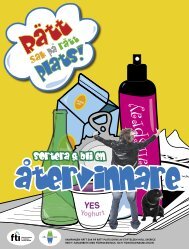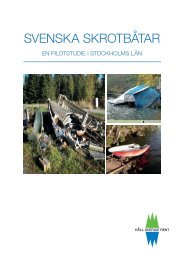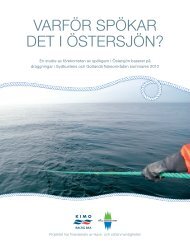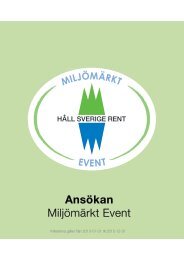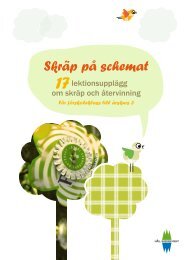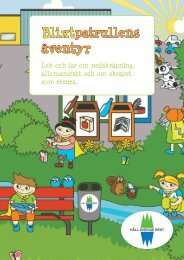KEEP SWEDEN TIDY - Håll Sverige Rent
KEEP SWEDEN TIDY - Håll Sverige Rent
KEEP SWEDEN TIDY - Håll Sverige Rent
You also want an ePaper? Increase the reach of your titles
YUMPU automatically turns print PDFs into web optimized ePapers that Google loves.
Being a Political Contact Person is an Honorary Task<br />
Schools and preschools working<br />
with the Eco-Schools<br />
programme choose a political<br />
contact person in the municipality,<br />
who will support and<br />
acknowledge the environmental<br />
and sustainability work of the<br />
school or preschool. The political<br />
contact person is a link between<br />
the school or preschool<br />
and the municipality, ensuring<br />
that the different actors can<br />
communicate and empower<br />
each other. The municipality<br />
learns from the school or preschool<br />
and vice versa.<br />
TEXT KATARINA HELLBERG<br />
International outlook<br />
In Sweden there are more than 3.000<br />
schools and preschools working thematically<br />
with the environment and sustainability<br />
through the Eco-Schools programme.<br />
All these activities are supported<br />
by international directives and legislation.<br />
In December of 2002, the General Assembly<br />
of the United Nations decided to proclaim<br />
a decade of education – 2005–2014 – for<br />
sustainable development, with UNESCO<br />
as responsible organization. The year before<br />
that, and in the beginning of the decade, the<br />
government chose to put in big recourses for<br />
schools to invest in research, education and<br />
further education about sustainable development.<br />
More and more schools and preschools<br />
joined the Eco-Schools programme, the certification<br />
program administrated in Sweden<br />
by the Keep Sweden Tidy Foundation. At<br />
the same time, the Swedish National Agency<br />
for Education was commissioned to initiate<br />
the Sustainable School Award. In November<br />
2010, the Ministers for Education of the EU<br />
gathered and agreed on the importance of<br />
Sverker Ottosson, the<br />
political contact person<br />
in Sundsvall:<br />
“Being a political contact<br />
person gives you inspiration,<br />
and new perspectives<br />
on life and problem<br />
solving. In my opinion, the concept is spot<br />
on,” says Sverker Ottosson, municipal<br />
commissioner for the Swedish Green<br />
Party, and chairman of the Committee of<br />
Infrastructure and Service of the Municipal<br />
Council.<br />
The Eco-Schools programme ensures<br />
that at an early age, and in a playful way,<br />
children will learn about the environment<br />
and understand their own role in an ecological<br />
and social context.”<br />
“When you are in a decision-making<br />
position, it is important to have a bearing<br />
on reality, and to have those important<br />
contacts. As a political contact person I<br />
get to know what our children and youths<br />
find important and what they want to<br />
change, and what daily life is like.”<br />
sustainable development in schools, and that<br />
appropriate measures would be taken.<br />
In 2001, the EU environmental policy<br />
was launched. It states that EU politics<br />
and legislation must better reflect environmental<br />
and sustainability issues, the public<br />
shall be informed and included and environmental<br />
concern will be taken when<br />
planning for cities and development. The<br />
environmental policy divides environmental<br />
and sustainability questions in four different<br />
fields: Climate Change, Nature and Biodiversity,<br />
Environment and Health, and Natural<br />
Resources and Waste. The policy suggests actions<br />
such as developing a strategy for sustainable<br />
use of natural resources, increasing the<br />
efficiency in use of natural resources, improving<br />
systems of waste management etcetera. In<br />
the EU environmental policy, the EU suggests<br />
a broad consultation with the governments<br />
of the candidate countries about sustainable<br />
development, as well as a close cooperation<br />
with Non-Governmental Organizations and<br />
companies in these countries. Measures taken<br />
Rosa Lundmark, the<br />
political contact person<br />
in Vantör:<br />
“The concept of political<br />
contact persons within the<br />
Eco-Schools programme<br />
is special, because it<br />
is such a positive task. Usually, being a<br />
politician means that people often contact<br />
you when they are dissatisfied and want to<br />
complain about things. In that respect, this<br />
assignment is unique.”<br />
Those are the words of Rosa Lundmark,<br />
member of the board of the Left Party of<br />
Sweden in Vantör, and vice president of the<br />
City District Committee of Enskede-Årsta-<br />
Vantör in the City of Stockholm.<br />
“I see this as an honorary task in my work<br />
as a politician,” says Rosa.<br />
“It is good for schools and preschools to<br />
be in contact with the politicians. We have<br />
a big department with quite a distance between<br />
the officials and the people who really<br />
work out there on the floor. We get so many<br />
papers to plow through, and this is a way<br />
for me to meet the children and the teachers<br />
and see a whole new side of things.” a<br />
to ensure the implementation of the international<br />
environmental agreements are strongly<br />
encouraged.<br />
Grön Flagg (Green Flag) is the Swedish<br />
name for the Eco-Schools programme, and<br />
with the Eco-Schools programme you can bee<br />
awarded the Green Flag. Eco-Schools is run<br />
by the international organization Foundation<br />
for Environmental Education (FEE).<br />
Eco-Schools was initiated in 1992, and<br />
exists in more than 60 countries all<br />
over the world. The representatives<br />
of the different countries meet every<br />
year for knowledge exchange.<br />
There are also possibilities for the<br />
schools and preschools linked to<br />
Eco-Schools to benefit from other<br />
projects worldwide, as well as to<br />
participate in shared projects about<br />
different themes, such as Climate and Local<br />
surroundings. This shows that the work with<br />
the Eco-Schools programme, and with the<br />
Com-U project receives support at all levels,<br />
both nationally and internationally. a<br />
school and preschool/facts – the keep sweden tidy foundation 7



